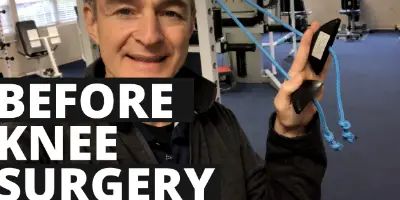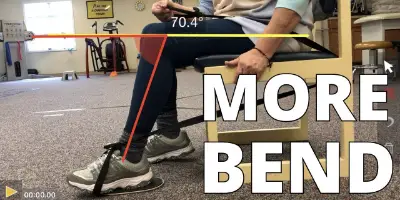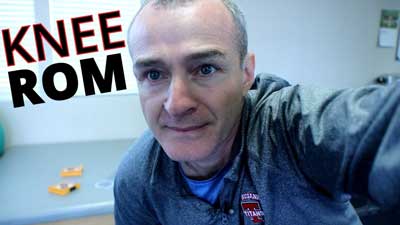7 Stretching & Strengthening Exercises for Frozen Shoulder
Frozen shoulder also known as adhesive capsulitis is a condition in which the shoulder is painful and stiff with limitations in range of motion.
The following 7 exercises were originally published by Harvard Health Publishing.
In this post I will be sharing videos demonstrations of each exercise along with tips and tricks to improve the effectiveness of these exercises.
1. Pendulum (Codman Exercises)
The main goal of the pendulum exercise is to relax the shoulder and allow gravity to gently pull on the arm.
To properly perform the pendulum exercise you will lean against a stable surface allowing your body to lean forward toward the floor. As your body sways forward and backward your hand will swing in a gentle arcing range of motion.
This exercise should be pain-free while being performed.
It is often advised to perform 20-pendulum swings per set and 3 sets per episode.
2. Towel Stretch (Internal Rotation Stretch)
During the towel stretch you will be placing the back of your hand against the back of your hip on the side you will be stretching.
Place a towel or pillow case over your opposite shoulder and while gripping the towel in the hand of the shoulder being stretched your opposite hand will pull up on the other end of the towel.
Be mindful to keep the stretched shoulder in a neutral posture throughout the stretch.
It is often recommended to hold the stretch for 30-seconds before releasing the pressure. Repeat 3 reps per set.
3. Finger Walks (Wall Slides)
To perform this exercise place your hand palm down against a smooth wall or door. Walk your fingers up the wall until a gentle stretch is felt in the shoulder.
Repeat this motion 10 times holding the top position for 3-5 seconds.
Watch the video to learn variations of the Finger Walk / Wall Slide.

4. Cross Body Stretch (Posterior Capsule Stretch)
To perform this exercise reach the hand of the shoulder you are stretching across the front of your body. Gently use the other hand to grasp your elbow and pull the elbow of the arm you are stretching across your body.
Hold this stretch for 30-seconds and repeat this exercise 3 times per set.
5. Arm Pit Stretch (Assisted Shoulder Flexion)
To perform this exercise place your arm on a stable surface. A desk or countertop works well. Sit in a chair beside the surface and as you lean your trunk forward your arm will be elevated into a shoulder stretch position.
Hold this position for 30-seconds. Repeat this exercise 3 times per set.
6-7. Resisted Internal / External Rotation (Strengthening Exercises)
To perform these two exercises without additional equipment you may use your opposing hand to resist the inward and outward motion of the shoulder being exercised.
Alternatives include using a pulley system or pillow cast.
10 repetitions performed in a slow and controlled manner are most effective.
Repeat this exercise for 2 sets.
About the Author -
Anthony Maritato, PT has been a licensed physical therapist since 2006. He specializes in post surgical care and rehabilitation of total knee replacement and rotator cuff repair surgery.
Mr. Maritato is also nationally recognized as a therapist educator teaching courses related to Medicare reimbursement, contracting, and documentation.
Total Therapy Solutions LLC is Tony's primary practice which he owns with his wife Kathy who is also a licensed physical therapist.
More Blog Posts …
Low cost minimalist shoes
Finding a low cost yet durable minimalist shoe can be challenging. Here is one that I have tested.
Best Minimalist Shoe In 2018 On Amazon – By A Physical Therapist
Minimalist shoes allow your foot to act like a foot. The ability for your toes to move, your arch to flex, and your whole lower kinetic chain to function is one of the main reasons to consider transitioning to a minimalist shoe.
Best Position To Sleep After A Total Knee Replacement
The best position to sleep in after a total knee replacement is flat on your back with a pillow under your heel.
This is because this position allows the knee to remain in full extension throughout the night.
If you are not experiencing difficulty achieving full knee extension you may prefer to sleep in other positions.
How To Use A Stationary Bike After A Total Knee Replacement
The upright stationary bike is a very common tool used in the rehabilitation of your total knee replacement. In many cases the upright stationary bike is preferred because it reduces the knee flexion requirements. In this video I show you some tips for using a stationary bike at home and turning a standard upright bike into a recumbent bike.
How to prepare for knee replacement surgery?
There is a lot you can do before your total knee replacement surgery to prepare. Step 1: Improve your cardiovascular fitness – your body will be dedicating much of its time and energy to repairing tissue. The better your heart and lungs are working the better your body can recovery. Step 2: Strengthen the rest of your body. While you are waiting on your knee surgery, you can strengthen the other 87% of your body. Step 3: Get your game face on. There will be plenty of mental and emotional challenges along the path to recovery. The better you prepare yourself to face these challenges the better you will be to overcome them.
Easiest Way To Increase Knee Bend At Home After A Total Knee Replacement Sitting – Real Patient
There are an infinite number of ways to bend your knee and all too often I see clients who have been told heel slides need to be completed while laying on your back. That simply isn’t the case. In this video I show you how to perform heel slides seated in a chair and using a strap to assist.
3 EASY Ways to Measure Knee Flexion at Home
Learn 3 easy ways to measure knee flexion at home.







